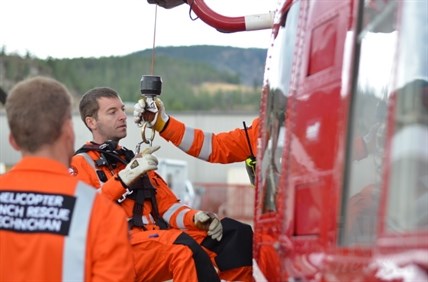
A SAR member trains on the winch at Wildcat Helicopters Inc. in Kelowna before performing the manoeuvre from the air.
(CHARLOTTE HELSTON / iNFOnews.ca)
September 29, 2014 - 4:28 PM
VERNON - Members of Vernon Search and Rescue are trying something new as they huddle around a helicopter watching a teammate dangle a few feet off the ground. The apparatus they're using is called a winch, and it will allow qualified technicians the ability to descend as much as 300 feet to the ground to help someone in need.
But first, baby steps. The rescuers will practice, practice, practice until the steps of the operation are drilled into muscle memory. The goal is to save lives, not jeopardize their own in the process.
This team is essentially writing the handbook for SAR units across the country as the first group to put the technique—dubbed a Helicopter Winch Rescue—into practice in Canada. The training is the beginning of a two-year pilot project involving Emergency management B.C., Vernon SAR and Wildcat Helicopters Inc., based in West Kelowna.
Wildcat vice president Ian Wilson says there will be a dedicated helicopter crewed 365 days a year, from dawn to dusk, ready to leave at a moment’s notice.
“This is all about saving lives and providing a service that isn’t there at the moment,” Wilson says.
Wildcat has experience conducting winch rescues in Australia, and Wilson is thrilled to see the life-saving service brought to Canada. As a pilot project, he says the public will play a large role in determining what happens after the two years are up.
“We need the public to step up and get behind this,” Wilson says. “If the public embraces it as we’re sure that they will and if the provincial government embraces it as we’re sure they will, and the need is proven, then we’ll be on our way. Until then, it’s a big gamble on everybody’s part.”
Paramedic and Vernon search and rescuer Jeremy Griffiths, originally from the United Kingdom, says the resource will make a huge difference in a variety of rescues.
“I can honestly say there’s a significant number of events I’ve been involved in where this facility would have certainly helped and made things better for the patient,” Griffiths says.
Before being considered for the aviation training, candidates have to have rope and water rescue training, as well as first aid skills under their belt. Individuals are put through a rigorous fitness test—including swimming with clothes on—and simulated medical scenario before even getting an interview.
“It’s very important that we protect all of our staff and members, therefore we have to make sure they’re capable of looking after themselves and potentially a patient, in a water environment, a hostile environment or a high cliff environment,” Griffiths says.
A winch rescue team is comprised of the pilot, the winch operator and two members who will go up and down the line. Medically trained personnel will deliver treatment to patients on the way to hospital or a waiting ambulance. Vernon SAR member Travis Anderson will be one of the people qualified to ride the line.
“There’s been a countless amount of times I’ve been on a rescue or a search and thought wow, it would be great for us to have a helicopter right now,” Anderson says.
Having only been in a helicopter a handful of times, he’s grateful for the baby steps.
“We train like crazy so that everybody goes home safe at the end of the day,” he says.
Vernon SAR made history Sept. 27 when, after many hours of training, a team successfully performed a demo of the Helicopter Winch Rescue.
To contact the reporter for this story, email Charlotte Helston at chelston@infonews.ca or call 250-309-5230. To contact the editor, email mjones@infonews.ca or call 250-718-2724.
News from © iNFOnews, 2014